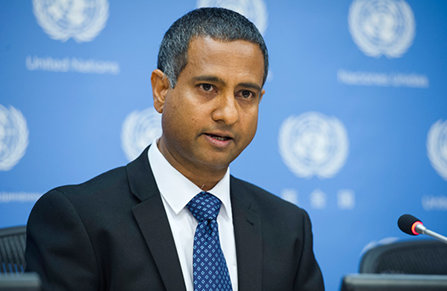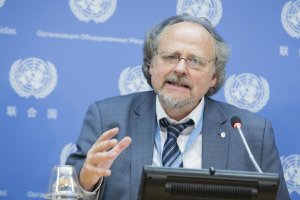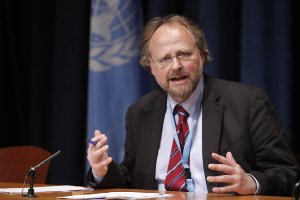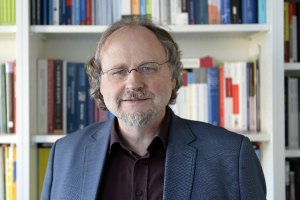Religious Freedom Mandate Extended Three Years to 2016

On 1 November 2016, Ahmed Shaheed assumed his mandate as Special Rapporteur on freedom of religion or belief. He is Deputy Director of the Essex Human Rights Centre and was the first Special Rapporteur of the Human Rights Council on the situation of human rights in the Islamic Republic of Iran since the termination of the previous Commission on Human Rights mandate in 2002. A career diplomat, he has twice held the office of Minister of Foreign Affairs of Maldives. He led Maldives efforts to embrace international human rights standards from 2003 to 2011.
Mr. Shaheed takes over the position formerly held by Professor Heiner Bielefeldt. The Special Rapporteur on freedom of religion or belief is an independent expert appointed by the UN Human Rights Council. The mandate holder has been invited to identify existing and emerging obstacles to the enjoyment of the right to freedom of religion or belief and present recommendations on ways and means to overcome such obstacles.
Historical background
The United Nations Commission on Human Rights appointed further to resolution 1986/20 a “Special Rapporteur on religious intolerance.” In 2000, the Commission on Human Rights decided to change the mandate title to “Special Rapporteur on freedom of religion or belief,” which was subsequently endorsed by ECOSOC decision 2000/261 and welcomed by General Assembly resolution 55/97. On 23 March 2016, the Human Rights Council adopted resolution 31/16, which, inter alia, extended the mandate of the Special Rapporteur for a further period of three years.
Mandate
The Special Rapporteur has been mandated through Human Rights Council resolution 6/37:
- to promote the adoption of measures at the national, regional and international levels to ensure the promotion and protection of the right to freedom of religion or belief;
- to identify existing and emerging obstacles to the enjoyment of the right to freedom of religion or belief and present recommendations on ways and means to overcome such obstacles;
- to continue her/his efforts to examine incidents and governmental actions that are incompatible with the provisions of the Declaration on the Elimination of All Forms of Intolerance and of Discrimination Based on Religion or Belief and to recommend remedial measures as appropriate;
- to continue to apply a gender perspective, inter alia, through the identification of gender-specific abuses, in the reporting process, including in information collection and in recommendations.
Working methods
In the discharge of the mandate, the Special Rapporteur:
- transmits urgent appeals and letters of allegation to States with regard to cases that represent infringements of or impediments to the exercise of the right to freedom of religion and belief;
- undertakes fact-finding country visits;
- submits annual reports to the Human Rights Council, and General Assembly, on the activities, trends and methods of work.
Source: http://www.ohchr.org/EN/Issues/FreedomReligion/Pages/FreedomReligionIndex.aspx


